Felicity Jones Reveals Why Her ‘Rogue One: A Star Wars Story’ Character Won’t Be Sexualized
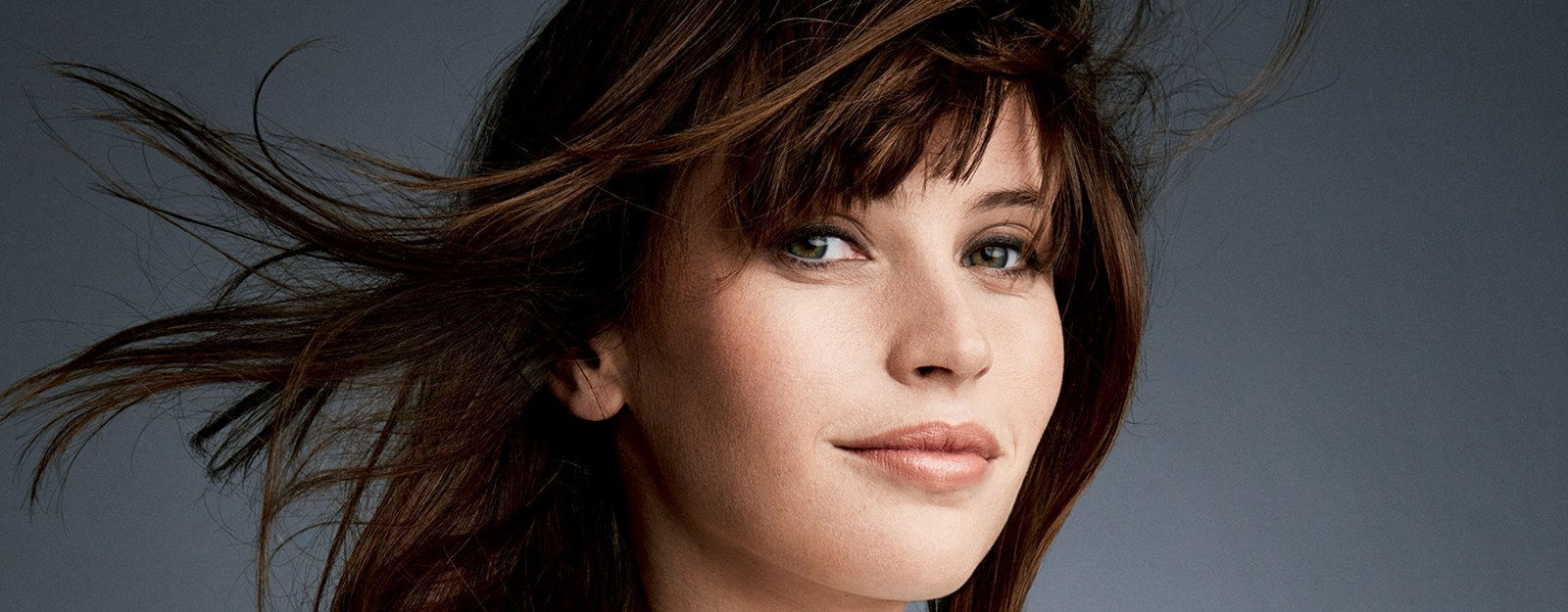
Growing up, I always felt that the Star Wars films belonged to the boys, no matter how much I played with lightsabers or wore my hair like Princess Leia’s. When the galaxy finally expanded to accommodate a female lead—Daisy Ridley’s Rey—in 2015’s The Force Awakens, I rejoiced. Now Rogue One: A Star Wars Story, which takes place 34 years prior to Rey’s rise, thrusts another bold woman front and center: Felicity Jones’ Jyn Erso. Jones’ character is rash, assertive, and unrestrained—messy, thrilling traits that too few actresses get to tap into in big-budget action movies. Jones well understands how Jyn changes the game: As a little girl in a town outside of Birmingham, England, she dreamed not of saving planets but of playing love-struck Ariel from The Little Mermaid. Today, at age 33, the Oxford-educated actress is officially getting her turn as a new kind of Disney princess: “a very contemporary, kick-ass princess,” she says.
Jones has built a résumé deep with roles of take-charge women like Jyn. Last fall she played a doctor one mental leap ahead of Tom Hanks’ smarty-pants professor in Inferno; next up she’s a mother desperate to shield her son from the ugliness of her cancer in A Monster Calls. (Her raw, intelligent performance could earn her a second Oscar nod; she received her first in 2015 for her portrayal of Jane Hawking in The Theory of Everything.) Says the self-proclaimed feminist: “What I love in my work is showing a full-sided woman, women who are strong but flawed.”
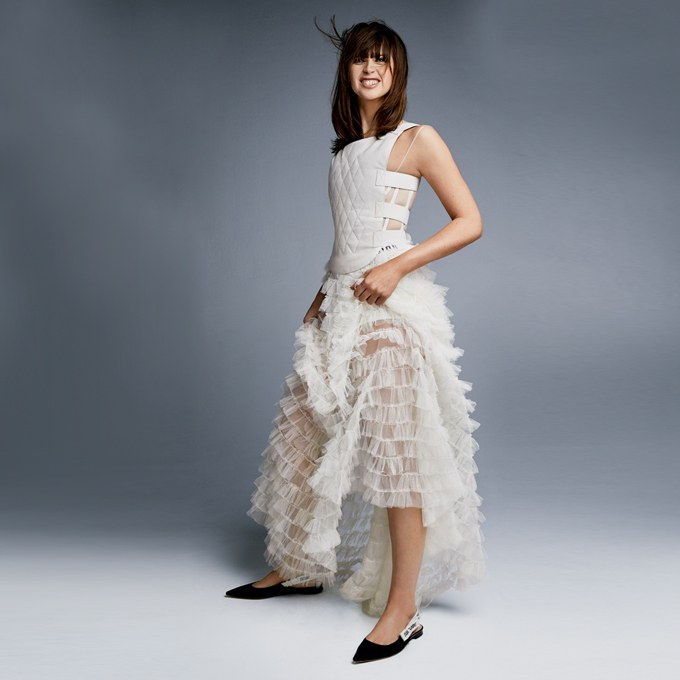
Dior top, dress, briefs, flats.
Though Jones is blanketing the big screen, she goes unnoticed by almost everyone at the cramped London coffee shop where we meet, save the winking barista who asks me if the famous woman is “good people.” She is. In person Jones is both impossibly lovely and pleasantly ordinary. She carries herself with a graceful old-school reserve, protecting the privacy of her life offscreen, a decision based in her desire for audiences to immerse themselves in her films. “When I go to the cinema, the less I know about the person, the more I can invest in them as characters,” she says. But Jones isn’t aloof: She spoke to me with conviction about the Force, feminism, and fighting to bring brainy women to the screen.
GLAMOUR: You started acting as a kid. How did you persuade your parents to let you go on these auditions?
FELICITY JONES: They never put up huge obstacles. But there was an emphasis on getting a good education. So I would work as hard as possible at school so I could keep acting alongside. It started off as a hobby…. Most of the time I was in the background. I never played [the Virgin] Mary. I was always kind of the third angel.
GLAMOUR: Where did you get your work ethic?
FJ: My mother [was in advertising and] worked incredibly hard when she was bringing us up. She was a working mother and a working single parent. [Jones’ parents divorced when she was a child; she lived with her mom.] That instills in you a sense of determination. But my father [a journalist] is a feminist as well. He talked to us about school and work, and also gave us a strong sense of identity in terms of finding, What do you want to do?
GLAMOUR: Was it important to you, even as a kid, to make your own money?
FJ: I always had a very strong sense of independence. I really liked being able to buy my Alanis Morissette Jagged Little Pill album. I wore that as a badge of honor. I love not having to rely on anyone.
GLAMOUR: Was there a character you really wanted to play as a kid?
FJ: The first film I ever saw at the cinema was The Little Mermaid, so I wanted to be Ariel. Now I am playing a Disney princess. [Disney bought the rights to Star Wars from George Lucas in 2012.] A very contemporary, kick-ass Disney princess!
GLAMOUR: Did you watch the Star Wars films as a kid? Who introduced you to them?
FJ: My boy cousins used to sit my older brother and me down and take us through a film-studies course. It included Tremors, The Goonies, and, of course, Star Wars. That was when it began: sitting cross-legged watching as the opening crawl goes up the screen.
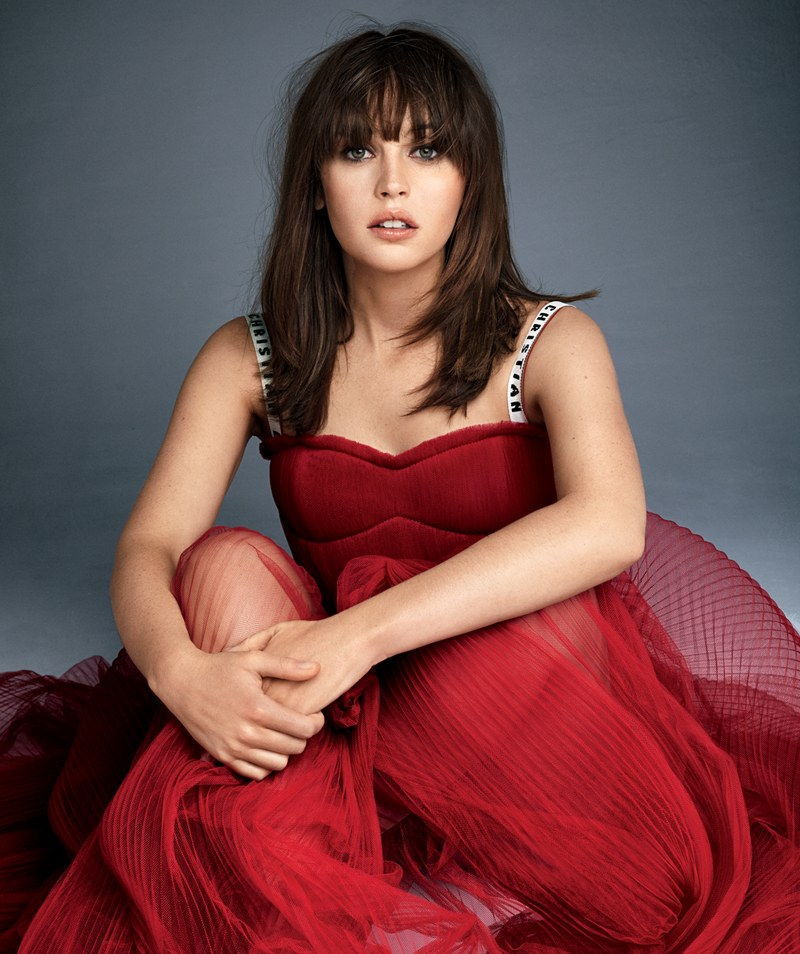
Dior dress, bra
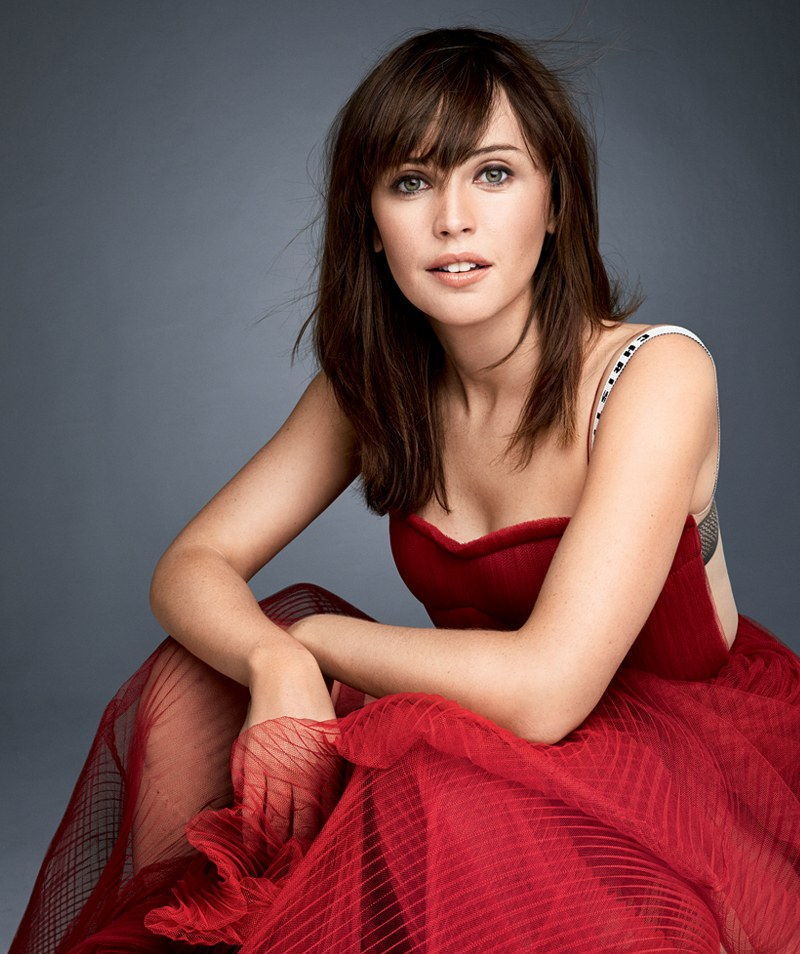
GLAMOUR: What was your audition process like for Jyn?
FJ: My agent called me up and said, “There is a tremendous female lead in the new Star Wars film, and I think you’re really going to like it.” The opportunity to play someone determined, who’s trying to find her skills as a leader; to be in a fantasy movie; to be able to do a leading female role in a film of that scale—that’s very, very rare.
GLAMOUR: In a Rogue One trailer, Jyn is described as reckless, aggressive, and undisciplined. Those are traits we’ve grown accustomed to seeing in male heroes, but they aren’t traits we usually get to see in our female heroes.
FJ: She’s a bit of a wounded animal when you meet her. There were moments when she’s been blown over, she’s scrambling to get up, and she falls. It’s important that she’s not perfect. [The director] Gareth [Edwards] and I, we want to see her being a human being.
GLAMOUR: You could describe Han Solo using those same words.
FJ: She’s obviously completely her own woman, but I felt like [she] was a rather beautiful blend of Luke Skywalker and Han Solo—and that came up in discussions around designing the costume.
GLAMOUR: She does have that Han Solo–esque belt! Gwendoline Christie, who played the first female Star Wars villain in The Force Awakens, said she loved how her character’s costume was sort of defeminized, utilitarian. Was yours always going to be the same way, or did you have to push back against attempts to sex it up?
FJ: Not for a second. Everyone wanted to create a character that was not in any way objectified. We didn’t want to sexualize Jyn.
GLAMOUR: So there’s no moment where Jyn is suddenly a prisoner in a gold bikini.
FJ: No way. [Laughs.] We don’t even see Jyn’s arms! That’s not her priority. She’s a survivor, and she has a mission to complete.
GLAMOUR: That’s a big deal to me, as somebody who grew up on the early films—that there’s not an eye candy moment for teenage boys to jerk off to.
FJ: Gareth said very early on, “I want guys to watch it and be like, ‘I want to be Jyn!’” A female friend of mine said, “I love that Jyn looks how we look, with trousers and a long-sleeved top.” We aren’t in hot pants. When do women walk around wearing hot pants?
GLAMOUR: Rarely. In the first big trailer, five of the 10 lines of dialogue are spoken by women, suggesting that the year’s biggest tentpole passes the Bechdel test [which rates films based on whether two female characters talk to each other about something other than a man]. Were your feminist needs met by this movie?
FJ: I’ve always been a feminist, and what I love in my work is being able to explore a full-sided woman and not patronize her. Particularly with Jyn, it’s such a rare opportunity to be able to play a female who’s not just thinking about [romantic] relationships.
GLAMOUR: Do you feel any relief in not being the first Star Wars female lead? Does it feel like Daisy Ridley’s Rey in The Force Awakens did a lot of work at putting gender wariness to bed?
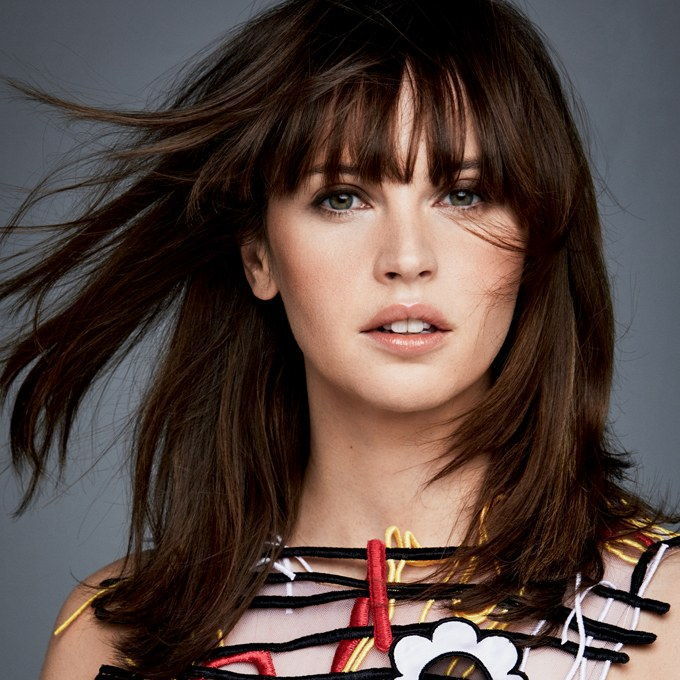
Christopher Kane top
FJ: Absolutely. And I hope now with Rogue One we’re in a place where of course women are going to be leading action films as well as men. I feel like Sigourney Weaver in Alien and Jennifer Lawrence in The Hunger Games, and then obviously Daisy in The Force Awakens, all passed on the baton.
GLAMOUR: Daisy’s character didn’t initially get her own action figure, an omission [The Force Awakens’ director] J.J. Abrams called preposterous and wrong. How did you feel onstage at the Star Wars Celebration, holding up Jyn Erso’s action figure?
FJ: It felt really momentous of how far we’ve come from when I was growing up. Playing with Barbies…
GLAMOUR: My mother wouldn’t allow me to have Barbies.
FJ: No, nor was I! [Laughs.] I was a tomboy running around in the garden. I used to play on a local cricket team. I grew up with all boy cousins, for the most part, and my brother. My mother was in the kind of late-sixties, early-seventies origins of female emancipation. And she was very much like, “You’re not going to be defined by how you look. It’s going to be about who you are and what you do.”
GLAMOUR: I heard that people call you Tiny Warrior. How did you earn that nickname?
FJ: I’m small. I’m petite. But I’m a bit of a fighter inside. In my work I fight for, I hope, showing women in a true way. They’ve got brains.
GLAMOUR: That’s true of your new string of roles. Is that deliberate?
FJ: I’ve never taken a role where I don’t like a person on the page. Sometimes there are changes that need to be made.
GLAMOUR: Have you suggested a change to a character?
FJ: I’m keen [to make sure] that the woman isn’t asking too many questions. Sometimes that can be an issue—she’s always asking questions and never speaking in statements.
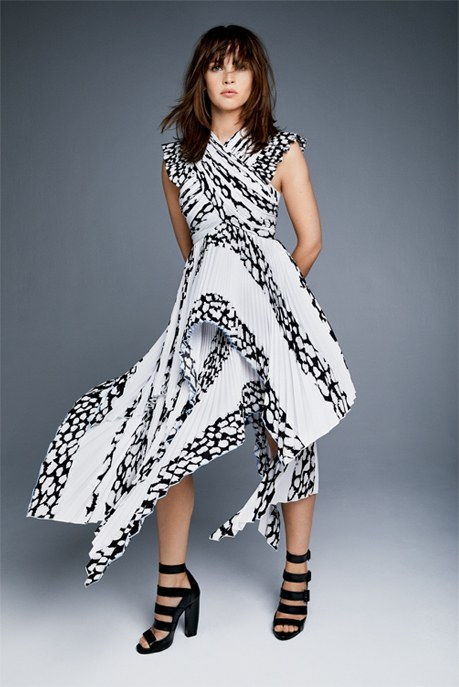
Proenza Schouler dress. Pierre Hardy heels.
GLAMOUR: Women at times finish our sentences on an up—
FJ: Delivering it up, as though you’re not sure of what you’re saying. Exactly. So you have to think: I know the answer to this question. I don’t need to ask. I can state. But I’ve been very lucky. Directors I’ve worked with have been very amenable to changes.
GLAMOUR: How else do you negotiate? Before you accepted Inferno, you said you needed certain days off so you could be present for your sister-in-law’s delivery when her baby came.
FJ: I’m keen to have balance, as much as possible. I put every ounce of myself into my work, but also it’s important that I don’t miss every single wedding of my best friends. I couldn’t do what I do without my friends and family.
GLAMOUR: Your friend Polly Stenham, the playwright, described you as “hellishly funny.” Who makes you laugh?
FJ: My friends, my family, my boyfriend [British commercial director Charles Guard].
GLAMOUR: When was the last time you really laughed at a TV show or a movie?
FJ: I both laughed and cried at Girls. I just have such, such respect for Lena [Dunham, the creator and star of the show]. And I got to actually be in it, which was fantastic.
GLAMOUR: Back to how you fight for yourself: Jennifer Lawrence and Patricia Arquette have advocated for equal pay. Do you feel comfortable talking about money? One report says you made twice as much as your male costars for Rogue One.
FJ: I want to be paid fairly for the work that I’m doing. That’s what every single woman around the world wants. We want to be paid on parity with a man in a similar position. And I think it’s important to talk about it…. It’s brave of those women to come forward and make a point about it. Now younger actresses will have a confidence in those discussions with their agents and be able to say, “Can we make sure that I’m being paid the right amount for the work that I’m doing?”
GLAMOUR: I want to talk about another great movie you’re in, A Monster Calls. You play a mother who is sick with cancer, but she is more than the “mom with cancer.”
FJ: Lizzie is still a bit of a child herself. She’s not always sweet and light. To cope with what’s happening, she’s quite tough.
GLAMOUR: She’s quite physically stripped down too.
FJ: I hate it when, in films, the girl looks perfect in every shot. It’s quite nice if there’s a bit of dark circles underneath the eyes, if we see the reality of the situation that the person is going through. I was so obsessed with all the details. We wanted to show her illness through how her hair changes. So very quickly, the “How do I look?” thing goes out the window. Those moments when you don’t feel self-conscious, when you escape that, are when you produce something meaningful.
GLAMOUR: It’s nice to hear an actress say she feels least self-conscious when she’s not looking her most glamorous.
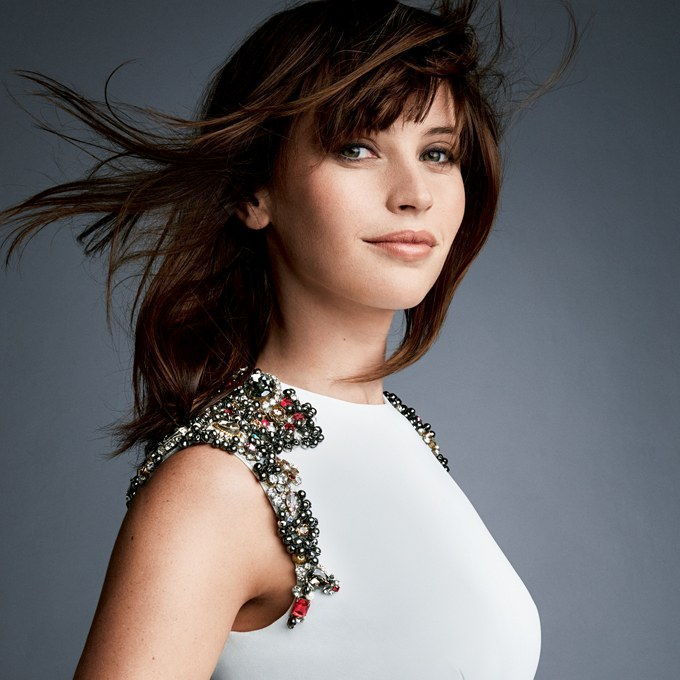
Alexander McQueen dress
FJ: I do, particularly.
GLAMOUR: You’re English. Let’s close with a speed round of English versus American culture. Favorite British versus American beer?
FJ: I cannot stand beer. But I love wine. I was in Napa recently. Delicious wines.
GLAMOUR: What’s a British vice, versus an American vice?
FJ: The British vice is overthinking before we speak, which is really annoying. I love the way that, in America, people are more straightforward. The American vice would be sometimes speaking too loudly. You can always hear American people on the trains!
GLAMOUR: Favorite British versus American fashion house?
FJ: I love Alexander McQueen and Erdem. And American, I love Proenza Schouler and Calvin Klein. Classic.
GLAMOUR: Classic.
FJ: [Reaches into her pocket.] And I’ve just realized I have the blaster [from Jyn’s action figure]. This is Jyn’s Lego blaster!
GLAMOUR: Why do you have that in your pocket?
FJ: Because somebody gave me a Lego doll of Jyn yesterday. I’m going to keep holding on to it.
GLAMOUR: Use that as your talisman to protect yourself.
FJ: Exactly. You’re right, I will. I will. Jyn will help me now.
Photographs by: Patrick Demarchelier
Fashion Editor: Jillian Davison

